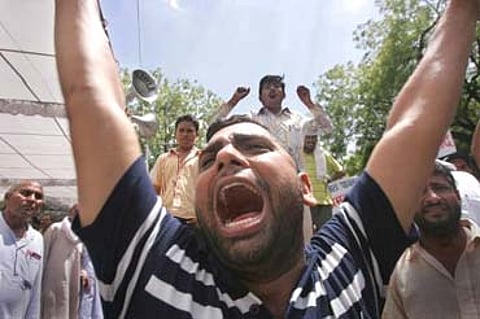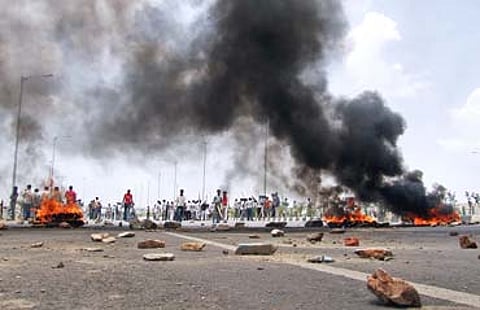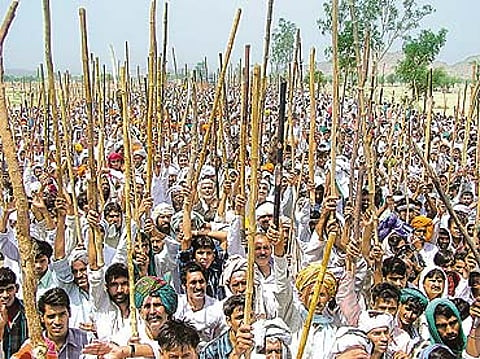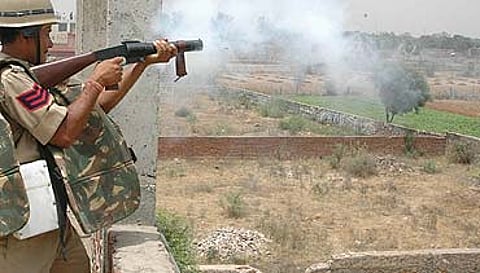As recently as March 29, the SupremeCourt had said:
Scheduled Trouble
The calling-off of the agitation that left 26 dead, hundreds injured, buses and trucks burnt, roads blocked, rail-tracks damaged and the country held to ransom for a week only offers a temporary reprieve. Expect more of such "mobilisations".
"Nowhere else in the world do castes, classes or communities queue up for the sake of gaining backward status. Nowhere else in the world is there competition to assert backwardness and then to claim we are more backward than you....the creamy layer rule is a necessary bargain between the competing ends of caste based reservations and the principle of secularism."
But our netas of course would rather mouth platitudes about social justiceand get all hot and bothered about the 'interventionist courts' while doingexactly what the Supreme Court was constrained to highlight as a warning onceagain: "Don't divide the country only because of your vote banks"

This of course was about the Other Backward Classes (OBC) quotas that ourworthy Human Resources Development (HRD) minister had sprung out of the box lastyear. The last one week's whole sordid spectacle has perhaps just been a smalltrailer of the worst fears of all those who have been warning the consequencesof this very caste-based reservation that need a complete re-look and overhaulrather than its perpetuation by a cynical political class. It was not withoutany reason that the founding fathers of the Constitution had suggestedreservation only for 10 years.
The absurdity of the 'social-justice' argument to classify and reclassifycommunities and castes is brought out starkly by the current crisis in Rajasthanwhich has been festering since 1999 when the relatively well-off Jats - who formabout one-fifth of Rajasthan's population and control the state's transport andagriculture - were included in the OBC list in the state by the BJP before thecrucial 1999 Lok Sabha elections. That it is all a numbers-game and only thoseresentments get exploited which can be channelised and mobilised into a loudenough protest is brought out by the fact that while the Jats cornered themajority of benefits under the OBC category meant for 80 diverse groups, it wasthe most electorally significant group of Gujjars who were egged on to clamourfor reclassification as STs.

It is not to suggest that the Gujjars do not have some validity to theirdemand - after all there is no reason why Meenas should be ST in Rajasthan, butnot the Gujjars. In fact, the whole sorry spectacle only underlines the sheerabsurdity of how the politicians have played with caste and identity politics, asad example of the ugly underbelly of grass-roots democracy in which only thenumerically significant groups get counted, and not the trulydisadvantaged. Thus, while communities like Meenas went from high caste, to "criminal tribe"in the British times to ST, or the Jats who are now OBC, or Gujjars who now wantto be STs from OBCs, there are a whole lot of "denotified tribes"(formerly the "criminal tribes" in British times) such as Sansis,Kanjars, Banjaras, Kalandars, Kalbelias who lack the numbers so necessary for apolitical bargain. It is not exactly ironical that just before violence eruptedon May 29, the Brahmins and Rajputs had also been renewing their demands forreservations on economic-criteria, but when did you hear of any protest from anyof the denotified tribes?
That the violence spiralled out of control to engulf the neighbouring UP,Haryana, Delhi and Madhya Pradesh only shows the utter incapacity of the variousFrankensteins to control the monsters of their making. The crisis once againbrings into sharp focus the ghastly re-runs of what seems to have become aninevitable outcome whenever it comes to the state deploying police and othersecurity forces to deal with large-scale protests: :an unusually high number ofcases of deaths as a result of police firing. The folly of 1999 by the BJP couldhave been mitigated if the saner heads among our political class had trieddefusing the resulting agitation. Instead, resentments, very real and perceived,were allowed to simmer and given the blatant downward regression let loose since- at the central level led by our redoubtable HRD minister and his variouscounterparts in Rajasthan and other states - it was inevitable that things wouldcome to the sorry pass they did, when the crying need of the hour was evolving aconsensus on relooking at caste-based reservations itself.

In this context, the fact that the agitation was called off today with theRajasthan government agreeing to set up a high-power committee headed by aretired High Court judge to examine the Gujjar demand for ST status does notreally offer more hope than a temporary reprieve. Because there seems norealisation of the fact that no matter what the "high-powered"committee comes up with as its recommendation, the incident would only signal arising recurrence of such "agitations" wherever any significant numberof people can be "mobilised" to protest. What is required, clearly, isa total rethink on the very system of reservations on which these contested andcharged battles are being fought.
Time Line
June 4:
- The week-long violent agitation by Gujjars that resulted in 26 deaths in Rajasthan is called off after the Rajasthan government agrees to set up a high-power committee headed by a retired High Court judge to examine their demand for Scheduled Tribe status. The three-member committee, which will examine the norms laid down for Gujjars in their current status in the OBC category and consider their representation for inclusion in the ST list, is to submit its report to the state government in three months.
- Gujjar leader Col Kirori Singh Bainsla apologises for the chaos and violence over the past week: "If members of the public were inconvenienced because of our agitation, I sincerely apologise... I, from the inner core of the heart, express my apology to those killed and their relatives".
- Meena community leader and Rajasthan minister Kirori Lal Meena also expresses satisfaction with the breakthrough, saying ''There will be peace in Rajasthan due to this breakthrough... The government has told us they will not send a letter recommending ST status for Gujjars and they have not".
- Normal life is affected in several parts of Delhi as Gujjars torch and damage buses, pelt stones at police and lay siege to all major roads leading to the national capital during a day-long shutdown. Police arrests 37 persons and detains at least 20 others on charges of rioting and destruction of public property and registers two cases against them in Mehrauli and Khajoori Khas localities.
- At least 24 train passengers, including two drivers, are injured when Gujjar agitators pelt stones at two trains in Mathura.
- In separate statements, prominent Jat community leaders, including Bharat Kisan Union leader Mahendra Singh Tikait, announce their support to the Gujjar movement saying their demands are "justified".
June 3
- Rajasthan Panchayati Raj Minister Kalu Ram Gurjar, along with six ruling party MLAs of Gurjar community, meet BJP chief Rajnath Singh to seek BJP high command's intervention.
- Congress MP from Dausa Sachin Pilot and other Gujjar leaders meet BJP president Rajnath Singh urging him to direct Rajasthan Chief Minister Vasundhara Raje to immediately take all steps to restore peace and order and stop ''atrocities'' on agitating Gujjars.
- The Rajasthan government extends the National Security Act to Pali, Alwar and Churu districts of the state.
- Leader of Opposition L K Advani demands an all party meeting to decide the parameters on which a community should come under any caste or tribe category.

June 2
- The fifth round of talks between Vasundhara Raje and Gujjar Sangarsh Samiti fails even as the Chief Minister announces an ex-gratia of Rs five lakh to the next of the kin of the victims of police firings. It is the first time that Chief Minister participates in talks with the Gujjars.
- Rajasthan ministers belonging to the Meena caste led by Relief Minister K.L.Meena hold discussion with BJP vice president Gopinath Munde in Jaipur and threaten to quit if the Gujjar's demands are accepted .
- Rail traffic in western Uttar Pradesh is severely hit as slogan-shouting Gujjars squat on railway tracks and damage them. Half-a-dozen shops are set ablaze in Meerut.
- The stringent National Security Act (NSA) is imposed in Bharatpur, Dausa, Karauli, Sawai Madhopur, Tonk, Bundi, Kota, Baran, Jhalawar, Ajmer and Jaipur districts for three months that were badly hit by Gurjar-Meena clashes. Under the Act, district authorities are empowered to arrest without warrant those indulging in arson.
- Senior Army officers of the Army carry out an aerial survey of Bharatpur, Dholpur, Alwar, Dausa, Karauli, Sawai Madhopur, Jaipur rural, Kota and Tonk districts to assess the situation and review traffic movements.
- Prime Minister Manmohan Singh hold a meeting with senior BJP leaders L K Advani and Jaswant Singh and issues an appeal to people to "desist from actions which may lead to further violence" and that the "events of the past few days in parts of Rajasthan have caused a great deal of pain and distress to large numbers of people... Sadly, many lives have been lost, plunging their families into grief".
- The Union Home Ministry sends a new advisory to the Rajasthan government asking it to initiate dialogue with eminent persons from both Gujjar and Meena communities for restoration of peace.
- BJP chief Rajnath Singh rules out the possibility of replacement of Chief Minister Vasundhra Raje after open criticism from party leaders like Jaswant Singh and Saheb Singh Verma. The RSS also defends Raje with an article in its mouthpiece Organiser blaming the Rajasthan police solely for the caste clashes saying "the Gujjar agitation in Rajasthan would not have gone out of control but for the brute police action.... The police could have handled the situation with more patience and finesse". It further adds that the "Rajasthan police has an unenviable reputation of being trigger-happy. It is high time trigger-happy Rajasthan police started mending its ways."
- After four days of disruptions, normal train services are resumed on the Delhi-Mumbai route via Gangapur city and Amritsar-Mumbai Central Golden Temple Mail become the first train to hit the tracks on the route since May 29. A batch of 1,000 stranded bus passengers leave Jaipur under tight security.
- Union Home Ministry enhances the security to Congress MP from Dausa, Sachin Pilot, to 'Z' Category from 'X' Category.
- The fourth round of talks between the four-member ministerial committee of the Rajasthan government and Gujjar leaders fails but both sides agree to meet again in presence of the Chief Minister. One of the Gujjar representatives claims that the state home minister G.C. Kataria had assured them of a recommendation letter on the ST status but due to stiff opposition from Meena MLAs and ministers, the government has "developed cold feet".
- Five persons are killed and 20 injured as thousands of Meena and Gujjar community members clash at Lalsot in Dausa where Gujjars were holding a demonstration in the Meena-dominated area. Nearly 30 houses belonging to Gujjars are also allegedly burnt down by members of the Meena community.

June 1
- Shoot-at-sight orders are issued against rioters in Sawai Madhopur and Bharatpur districts. A bandh, called in support of the Gujjars' demand, is observed in Tonk, Alwar, Nagaur, Bhilwara, Ajmer, Churu, Baran, Chittorgarh, Jhunjhunu, Karauli, Rajsamand, Sikar, Jaipur rural areas and Jhalawar.
- The Delhi-Jaipur National Highway 8, which was blockaded by the agitating Gujjars since May 29, is opened to traffic with the Army and para-military forces providing security.
- The University of Rajasthan postpones examinations on June one and two in view of agitation.
- Armed Meena community members organises a Mahapanchayat in Nangal Pyaribaas in Dausa district and threaten the state government and Gujjars that if the National Highways would not be opened the Meenas would intervene and open the Highways.
- Gujjars in Haryana, Punjab, Madhya Pradesh and Delhi protests police action against their community in Rajasthan by blocking roads and burning effigies of Vasundhara Raje.
May 31
- The first two rounds of Gujjar-Rajsathan government meeting held in Dausa fails. Gujjars demand withdrawal of cases registered against them in connection with violence in the state.
- Four protesters killed in police firing in Sawai Madhopur and Jaipur districts. Incidents of arson, stone pelting and clashes with police are reported from Ajmer, Pushkar, Alwar, Bharatpur, Chittorgarh, Tonk, Kota, Dholpur, Bundi and areas adjoining the state capital as violent protests spreads.
- An all-party meeting convened by the state government appeals to the agitating Gujjars and their leaders to restore peace in the state.
- The BJP rules out change of guard in Rajasthan saying Vasundhara Raje government has done a good job by setting up a cabinet sub-committee on the Gujjars' issue and asking 33 district collectors to prepare a fresh status report of the community which is privileged in the OBC category.
- Congress MP Sachin Pilot meets Home Minister Shivraj Patil and demands imposition of President's rule in the state for its "callous" attitude in handling the issue. The Home Minsitry alerts Delhi, Haryana and Uttar Pradesh governments to beef up security so that violence does not spread to these states having a sizeable Gujjar population.
May 30
- One more person is killed and five are injured in police firing in Rajasthan's Bayana town n Bharatpur district where Gujjars torch several government buildings, including a courtroom and offices of a power station, sub-divisional magistrate and a civic body. Two columns comprising 200 personnel of the Army are later called out to assist the civil administration in Bayana. Two police stations are also set ablaze in Dubi and Sikandra in worst-hit Dausa district where agitators continued the blockade of Jaipur-Agra highway for the second day from Pipalkhera to Pachroli in neighbouring Karuli district.
- The government's bid to restore normalcy by offering to hold talks with representatives of the Gurjar Reservation Sangharsh Samiti leaders, including Col. Kirori Singh Bainsla, fails to take off as.
- Rajasthan Panchayati Raj Minister K L Gurjar and five Gujjar MLAs of the ruling BJP offer to resign in the wake of agitation and violence on the issue of grant of Scheduled Tribe status to the community.
- The Congress party tries to avoid demanding imposition of President's rule in Rajasthan with AICC spokesperson Jayanti Natarajan saying ST status for Gujjars is a "serious and complicated issue and there is no piecemeal solution of this issue".
- The dead body of one the two policemen, who went missing during a clash in Dausa district, is found while the other other returns safely.
May 29: At least 13 people, including a policeman, are killed and atleast 100 injured in clashes and police firing in Dausa, Karauli and Bundidistricts of Rajasthan during protests by theGujjar community demanding Scheduled Tribe status.
Tags